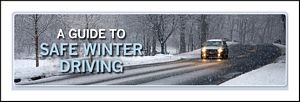|
By accessing/using The Crittenden Automotive Library/CarsAndRacingStuff.com, you signify your agreement with the Terms of Use on our Legal Information page. Our Privacy Policy is also available there. |

Get Your Car Ready For Winter Driving says Claire Atkinson
|
|---|
|
|
Get Your Car Ready For Winter Driving says Claire Atkinson
Claire Atkinson
DriveWrite
October 25, 2013
As daylight hours get shorter and the weather gets colder, are you prepared for driving in the winter months ahead? More to the point, is your car? Adverse winter weather can be hard on vehicles, and to avoid accidents, delays or big expense, you will want to make sure that your car is ready for whatever driving conditions the British weather brings.
1. Carry necessary supplies
If you intend to do a lot of long distance driving during the winter, be prepared for incidents by carrying an emergency kit in your boot. Have warm clothing with you at all times, and make certain that you also carry useful items such as a spare blanket, a fully-charged mobile phone, a torch, a de-icer and ice scraper, a spade, jump leads, a first aid kit, and non-perishable food and drink in case of being stranded in a remote spot. Don’t let your fuel level get too low, as you are likely to use more petrol or diesel than usual if you get stuck in a traffic jam and leave the engine running to keep yourself warm.
2. Check your vehicle regularly
To really ensure that your vehicle is winter-ready, consider having it serviced at your local garage, if you have not already done this. At the very least, make regular checks of the levels of your oil, water, windscreen washer fluid, and also have your tyres checked for good tread and inflation so that you will experience better traction on icy roads. When topping up your water, make sure you use the right mix of antifreeze and water as recommended for cold conditions.
3. Check wiper blades
If your windscreen wiper blades are not doing a good job of keeping your windscreen clear, it will definitely hurt your visibility when driving, which can be bad enough when ice and snow are coming down. You may want to invest in new wiper blades before winter sets in to be certain of having the cleanest windshield possible during bad weather.
4. Keep lights free of snow
When you are driving in heavy snow, your lights can be obscured very easily to the point where other drivers may not see you coming. Periodically pull over to the side of the road during heavy storms to ensure that snow is not building up in front of your lights.
5. Consider breakdown coverage
It can be a sensible precaution to invest in breakdown coverage that will protect you from expensive charges if your car breaks down on the road and you need to call for help, particularly if you do a lot of motorway driving. Breakdown cover is included with some bank accounts and car insurance policies, so it’s worth checking whether you already have cover before purchasing a new policy. It’s also wise to compare levels of cover and not base your decision purely on price. For example, if your car can’t be fixed at the roadside, do you want to be towed to the nearest garage or all the way home?
6. Plan your route
If you need to go on a long journey during the winter months, plan the route you will take before you even leave home, sticking to main roads where possible, as some smaller country roads are unlikely to be gritted. Use a Sat-Nav if you have one. Before leaving, look online to check there are no travel delays on your planned route, such as a closed road necessitating detours. Listen to a local radio station in the car to hear any announcements about traffic delays or road closures. If the weather is bad and you really do not need to travel, you are better off staying at home. However, if your journey is necessary, allow extra time to reach your destination to allow for a slower driving speed and possible delays.
7. Always drive sensibly
Do not take any chances when you drive in snowy conditions. Even if you feel that you are an expert driver, accidents can still happen, especially if you do not drive slowly and sensibly. Regardless of what other drivers around you may be doing, use your head when driving during the winter.
The cold winter months can be more pleasant if you have keep your car properly maintained and use common sense while driving on icy, snowy roads.
Author Claire Atkinson writes for http://www.kanetix.ca/calgary-car-insurance-ab a car insurance comparison website.



















